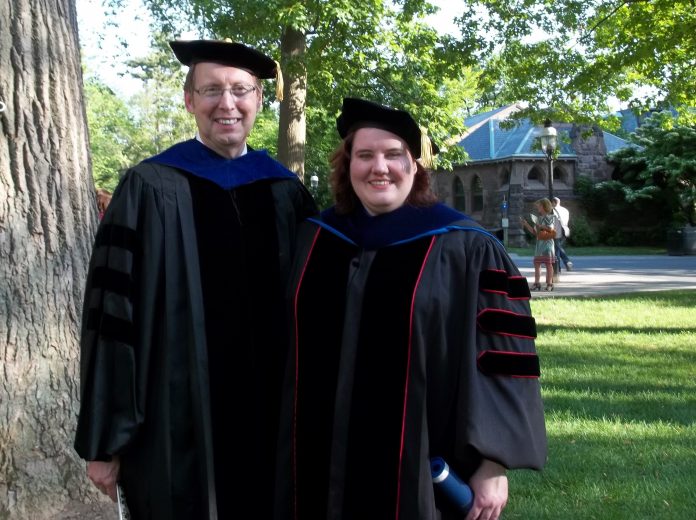As a high school student in a conservative Southern Baptist family, Visiting Assistant Professor of Religious Studies at the College of William and Mary Robin McCall swore that she would never read the Old Testament again once she left for college. However, following stints in an array of diverse occupations, McCall now works with those biblical texts every day as a researcher and lecturer at the College.
McCall has taught in the College’s classical studies and religious studies departments for the past six years. Unlike professors who meander from doctorates to cushy tenure-track positions with little deviation, McCall’s winding odyssey through various jobs and academic endeavors made her journey to the College more exciting than most.
After studying psychology and religious studies at the University of Virginia, McCall originally intended to become a counselor. It didn’t take long for McCall — a self-described “control freak” — to realize that her personality was incompatible with the profession, and that her genuine desire to help her patients was eclipsed by discomfort with therapy’s volatile and uncontrollable nature.
“I did part of a semester in graduate work in [counseling], and I realized, ‘Wow, I hate this; I don’t really want to do this at all,’” McCall said.
Once she decided against a career in counseling, McCall looked to her hobbies to inspire her next career move. A lifelong musician, McCall decided to enroll in a seminary school to study church music and began coursework at the Baptist Theological Seminary at Richmond. As part of her church music education, she was required to take classes on the Hebrew Bible and the Hebrew language, both of which sparked underlying academic passions.
“I took Hebrew … and the language came so naturally to me … I just thought it was beautiful, it was a lot like music,” McCall said. “By the end of two years of studying it, I was just pretty crazy about the whole field.”
After her time in seminary school, McCall moved to Charles City, Virginia, where she served as a minister of music for three years at a Baptist church. In this role, she directed the sanctuary choir, developed musical scores for the church’s worship services, and occasionally served as a stand-in pastor. While the work was rewarding, McCall found it increasingly difficult to resist the intellectual enchantment she had encountered in studying Hebrew.
McCall’s newfound zeal for the Hebrew Bible and language was a reversal from how she had felt about both topics earlier in her life, when she had vehemently evaded reading the Old Testament. After years of dreading facing the biblical texts, she found herself craving intellectual discourse on the Hebrew Bible and felt a strong pull towards scrutinizing the texts from an analytical standpoint.
“I remember very clearly thinking when I was a teenager that the Bible was boring,” McCall said. “I consciously remember having the thought, ‘When I am an adult, I will never read the Old Testament again, because it is boring.’”
Despite her intensifying academic interest in religion, McCall also found herself confronting a burbling uneasiness in her relationship with the church during this stage in her career. While she was raised in a devoutly religious family, she faced the daunting realization that she increasingly preferred analyzing religion from an academic standpoint than experiencing it from the pew. Furthermore, she felt uneasy with the Southern Baptist Church’s treatment of some marginalized groups, which were antithetical to her own personal religious beliefs.
“… I had so many friends who were LGBT and seeing how the church had not been kind to them. …” McCall said. “It became very hard for me to sustain a lasting relationship with the church — not with God, I’ve never struggled in my relationship with God — but I have struggled in my relationship with the church.”
“… I had so many friends who were LGBT and seeing how the church had not been kind to them. …” McCall said. “It became very hard for me to sustain a lasting relationship with the church — not with God, I’ve never struggled in my relationship with God — but I have struggled in my relationship with the church.”
In facing these existential ponderings, McCall turned to her budding passions for the Hebrew Bible and language, and ventured to Princeton, New Jersey, where she spent nine years at the Princeton Theological Seminary pursuing a doctorate in Hebrew Bible studies.
When McCall received her doctorate nearly a decade later, she yearned to return to Virginia. Following a tip from a friend who advised her about an opening in the College’s classical studies department, her homeward inclinations brought her to Williamsburg. She initially began working at the College as a Hebrew language instructor and served as an adjunct professor for two years. Since then, McCall has transitioned to teaching primarily in the religious studies department, and offers courses delving into ancient Israelite religious history and the Torah’s literary merits.
Now in her sixth year of teaching at the College, McCall stands on the precipice of yet another career shift. In addition to maintaining her professorial duties, she began a second master’s degree in library science in January and is in the process of applying to a vacant library position at the College. Regardless of whether she is in the Sir Christopher Wren Building or the Earl Gregg Swem Library in the fall, McCall wants every student she interacts with to reflect critically on their beliefs, confront difficult realities in their life, and face challenging questions of faith and existence head-on.
“I do hope people come away with a feeling that it is okay to ask the questions, that it’s good to ask the questions … if you’re a person of faith, God is big enough for you to ask the questions,” McCall said.

